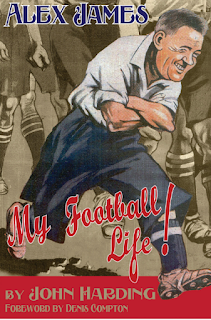The first thing that comes to mind when reading this book is
why bother reading about a player, no matter how good, who died nearly 74 years
ago, and last played for Arsenal two years before Hitler invaded Poland.
From a footballing standpoint it is clear from even a
cursory look at video footage of Alex James that he was an exceptional player
and according to Ham & High Sport “In pantheon of Arsenal greats, he stands
shoulder to shoulder - at the very least - with the likes of Dennis Bergkamp,
Tony Adams, Frank McLintock and Joe Mercer.”[1]
People follow football teams for many different reasons. For
me, I think the same way as Dennis Bergkamp: “When you start supporting a
football club, you don't support it because of the trophies, or a player, or
history; you support it because you found yourself somewhere there — found a
place where you belong.” While this is true in my case, I also fell in love
with Arsenal because of its history.
My first season supporting Arsenal was the 1970/71 season. Many
things attracted me to Arsenal. I mentioned its rich history, but what got me
hooked was not only the atmosphere and the smell of fresh hot dogs, but Highbury
was a thing of aesthetic beauty, so much so that its Art Deco design is still a
listed building.
My first game, funny enough, was sitting in virtually the
same seats as the Arsenal fan and writer Nick Hornby sat when his dad took him
to his first game in the West Upper stand. The film Fever Pitch starring Colin
Firth[2]
Shows Hornby's amazed look as he took in his first game. Another thing that attracted
me was that Arsenal seemed to embody a classy way of doing things and embodied
the mantra “ Play up and Play the Game”.[3]
It is to John Harding’s credit that he has reintroduced
James to a modern readership. First published in 1988, this reissue in 2024 is updated
with new stories and pictures. "Since the first release, I have added lots
of new material and have changed my stance on James' footballing role, Reprinting
my book with new material, especially after leaving Highbury relatively
recently in terms of the club's history, seemed like a good opportunity to
revisit his story - and to reintroduce him to a new generation of supporters,
because we should not forget what Alex James meant to Arsenal.
"I am too young to have seen him play, but when I first
started going to Arsenal back in the late 1950s, many people around me had seen
him. "I grew up on stories about him, and he became a hero - James simply
struck a chord with me. For me, Alex James was Highbury." The book is meticulously researched and is one
of the best books on the history of Arsenal Football Club. James was admired and
deeply appreciated by his fellow professionals.
As a young boy, the great Tom Finney[4]
Saw James play at Deepdale, Preston, saying "James was the top star of the day, a
genius. There wasn't much about him physically, but he had sublime skills and
the knack of letting the ball do the work. He wore the baggiest of baggy shorts,
and his heavily gelled hair was parted down the centre. On the odd occasion
when I was able to watch a game at Deepdale, sometimes sneaking under the
turnstiles when the chap on duty was distracted, I was in awe of James. Preston
were in the Second Division and the general standard of football was not the
best, but here was a magic and a mystery about James that mesmerised me."
While James and his fellow professionals' lifestyle is a
million light years away from the pampered multi-millionaires of today with
their private jets, His lifestyle also set him apart from his fellow workers of
his day.
As John Harding writes in his Oxford Dictionary of National
Biography article, “James was a flashy, charismatic figure, easily identifiable
on the field of play by his baggy shorts and flapping shirt and perfectly
captured for posterity by the great sporting cartoonist of the inter-war years,
Tom Webster (whose cartoon Harding uses for the cover of his updated Book). Off the field, he was regularly in the
news, usually demanding a higher wage or a transfer. James enjoyed the West End
lifestyle available to a London-based player and was a regular habitué of
fashionable cafés and bars. He was a prolific spender and a snappy dresser, but
was unfortunate to be a sporting star at a time when footballers, though as
well known as film stars, were paid a pittance by comparison.
He made strenuous efforts to cash in on his 'image': he was
a sports demonstrator at Selfridges, he had regular columns in national
newspapers, and he appeared in advertisements for cigarettes and sports goods.
But when he retired in 1937, he had accumulated little, partly because he had
no real business acumen. In 1938, he went to Poland to coach the Polish
national side—a position he enjoyed but which came to an abrupt end when
Germany invaded Poland in August 1939. During the war, James served as a gunner
in the Royal Artillery's maritime division stationed on the east coast. In 1947,
he rejoined Arsenal as a reserve team coach, but he contracted cancer and,
after a short illness, died on 1 June 1953 in the Royal Northern Hospital,
Holloway, London. He was cremated at Golders Green crematorium.”[5]
[1]
https://www.hamhigh.co.uk/news/21388151.remembering-arsenal-legend---alex-great/
[2]
https://en.wikipedia.org/wiki/Fever_Pitch_(1997_film)
[3]
https://exhibits.lib.byu.edu/wwi/influences/vitai.html
[4]
https://en.wikipedia.org/wiki/Tom_Finney
[5] James, Alexander Wilson (1901–1953) John Harding doi-org.lonlib.idm.oclc.org/10.1093/ref:odnb/3414723-2004
